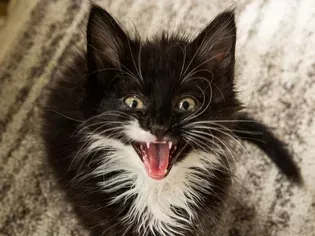What You Should Know About Kitten Teeth and Dental Care
Updated on 05/26/24

Delving into the World of Kitten Teeth: A Comprehensive Guide to Dental Care
As a loving cat owner, ensuring your feline friend's oral health is paramount for their overall well-being. Kittens, with their delicate teeth and developing mouths, require specialized dental care. This in-depth guide will empower you with the knowledge to maintain your kitten's pearly whites and prevent dental issues from marring their adorable smiles.
Understanding Kitten Teeth Development
Kittens enter the world toothless, but their baby teeth, known as deciduous teeth, begin to emerge around 2-3 weeks of age. These deciduous teeth are smaller and sharper than permanent teeth and fall out by 6 months of age, making way for their adult counterparts.
Types of Kitten Teeth
Kitten teeth can be categorized into four types:
* Incisors (6): Sharp, front teeth used for cutting and nipping.
* Canines (4): Long, pointed teeth located behind the incisors, used for gripping and tearing.
* Premolars (10): Flatter, wider teeth used for chewing and grinding.
* Molars (4): The largest teeth, responsible for crushing hard food.
Dental Care for Kittens
Maintaining your kitten's dental health requires a multifaceted approach. Here are some essential practices:
1. Regular Brushing:
* Introduce your kitten to brushing gently with a soft-bristled toothbrush and kitten-safe toothpaste.
* Start with short, 10-second sessions and gradually increase the duration as they tolerate it.
* Brush several times a week, focusing on the outer and inner surfaces of the teeth.
2. Dental Check-ups:
* Schedule regular dental check-ups with your veterinarian for professional cleaning and examination.
* These check-ups allow early detection of dental issues, such as plaque, tartar, and gum disease.
3. Dental Diet:
* Provide your kitten with a balanced diet that supports healthy teeth.
* Dry kibble and dental treats can help remove plaque and stimulate chewing.
* Avoid sugary foods and treats, as they can contribute to dental problems.
Common Kitten Dental Issues
Despite your best efforts, dental issues can arise in kittens. Here are some common concerns:
1. Gingivitis:
* Inflammation of the gums, often caused by plaque and tartar buildup.
* Symptoms include redness, swelling, and bleeding gums.
2. Periodontal Disease:
* A severe form of gingivitis that damages the supporting structures of the teeth.
* Can lead to tooth loss, pain, and systemic health issues.
3. Retained Deciduous Teeth:
* Some kittens may retain their baby teeth, preventing adult teeth from erupting properly.
* These retained teeth can cause dental problems and should be extracted by a veterinarian.
Conclusion
Maintaining your kitten's dental health is a crucial aspect of their overall well-being. By following these practices and addressing any dental issues promptly, you can help your feline companion maintain a healthy, pain-free smile throughout their life. Remember, a happy cat is a cat with a clean, healthy mouth.
Explore More Pets

Cat Behavior Problems
How to Stop Aggression in Kittens

Long-Haired Cat Breeds
Siberian Cat: Breed Profile, Characteristics, & Care

Cat Behavior Problems
How to Stop Kittens From Scratching and Biting

Long-Haired Cat Breeds
Turkish Angora: Cat Breed Profile, Characteristics & Care

Basic Training
How to Socialize Your Kitten

Short-Haired Cat Breeds
Cute Pictures & Facts About Calico Cats & Kittens

Litter Box Training
Training Your Kitten to Use the Litter Box

Long-Haired Cat Breeds
10 Fun Facts About White Cats
